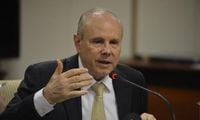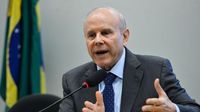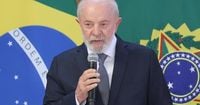On Thursday, March 27, 2025, President Luiz Inácio Lula da Silva submitted nominations for the councils of Eletrobras, following a significant conciliation agreement aimed at increasing government influence within the company. The nominations include former Finance Minister Guido Mantega, who is set to occupy a position on the Fiscal Council. Additionally, the Board of Directors will see the inclusion of ex-ministers Silas Rondeau and Nelson Hubner, along with Maurício Tolmasquim, who serves as the director of energy transition at Petrobras.
This move comes just a day after Eletrobras and the federal government signed an agreement that allows for a larger participation of the Union in the company’s Board of Directors. This agreement, which has been in negotiation for two years, reflects President Lula's push for greater influence over Eletrobras’ strategic decisions.
The accord also redefines Eletrobras' obligations regarding Eletronuclear, particularly concerning the Angra 3 nuclear plant project. Should the government decide to proceed with the project, Eletrobras will no longer be required to invest in its construction. Instead, a new mediation process will be initiated to determine the next steps for the project.
Under the privatization model implemented during Jair Bolsonaro's presidency, the Union lost control of Eletrobras to private entities but retained around 40% of the company’s shares. However, a rule was established that limited any shareholder's voting power to 10%, regardless of the number of shares held. This limitation has been a point of contention for the Lula administration, which argued that it restricted the government’s ability to influence key strategic decisions.
The recent agreement expands the government's influence by increasing its representation on the Board of Directors to three out of ten seats, up from just one previously. This change is significant given that the government claims to hold approximately 46% of the company's shares, including those held by various state entities such as BNDES and Caixa.
In a broader context, the privatization of Eletrobras has been a controversial topic, with the Lula government facing resistance from private shareholders. Previous attempts to place Mantega in significant roles, such as the presidency of Vale, were met with pushback, highlighting the ongoing struggle between public interests and private shareholder influence.
Mantega, who served as Finance Minister during the PT administrations from 2006 to 2014, has a history of involvement in energy and economic policy. His nomination to the Fiscal Council is seen as a strategic move to bolster the government’s position within Eletrobras, especially given his experience and past roles in public office.
Rondeau, Hubner, and Tolmasquim, all of whom have held significant positions in previous PT governments, are also expected to advocate against privatization efforts. Rondeau, a former Minister of Mines and Energy, currently presides over the Empresa Brasileira de Participações em Energia Nuclear e Binacional (ENBPar), while Hubner previously served as the director-general of the National Electric Energy Agency (Aneel).
As part of the agreement, Eletrobras is relieved from its obligation to invest in Angra 3, which has been a contentious issue due to its financial implications and the environmental concerns surrounding nuclear energy. The company has committed to participating in a new mediation process to assess the economic viability of the project moving forward.
The upcoming ordinary general meeting of Eletrobras, scheduled for April 27, 2025, will be crucial as it will determine the approval of these nominations and the agreement itself. Shareholders will have the opportunity to weigh in on the government's increased representation and the future direction of the company.
The remuneration for Eletrobras counselors is approximately R$ 86,000 per month, while members of the Fiscal Council earn just over R$ 12,000 per month. The financial stakes involved in these roles underscore the importance of the decisions that will be made in the coming weeks.
The Lula administration’s efforts to regain control over Eletrobras reflect a broader strategy to reinforce public ownership in key sectors of the economy, particularly in energy. This situation mirrors ongoing global trends where governments are reassessing their roles in privatized industries amid rising public concerns about energy security and sustainability.
As the political landscape continues to evolve, the outcomes of these negotiations and appointments will likely have significant implications not only for Eletrobras but also for Brazil’s energy policy and economic stability.









